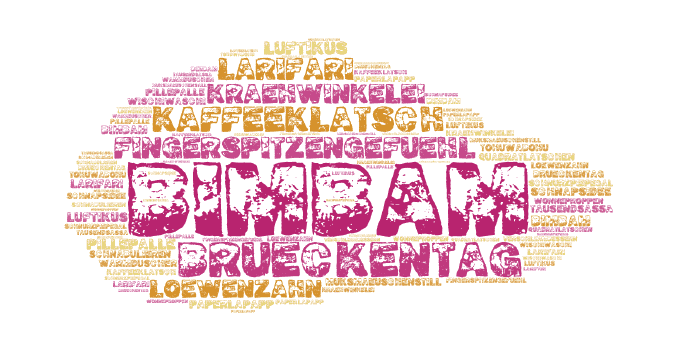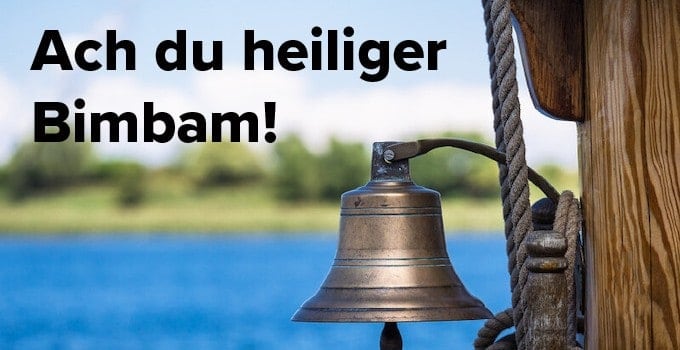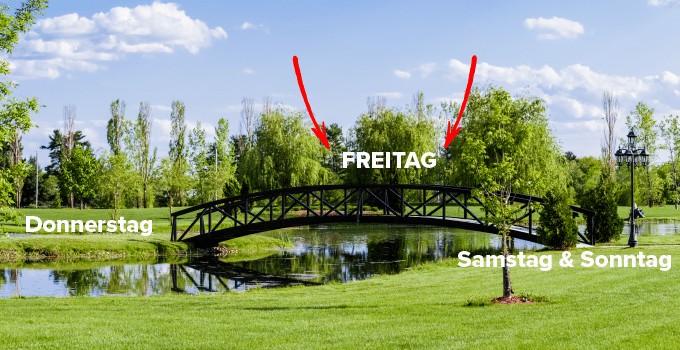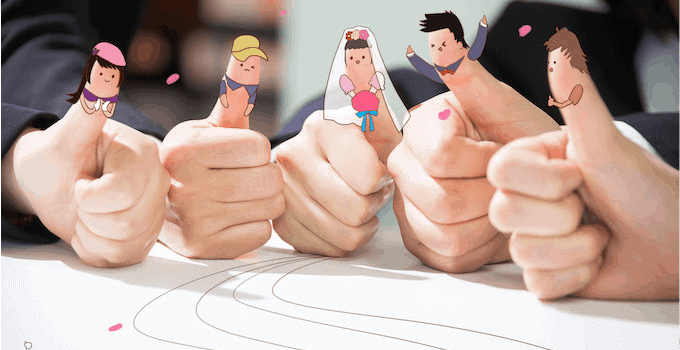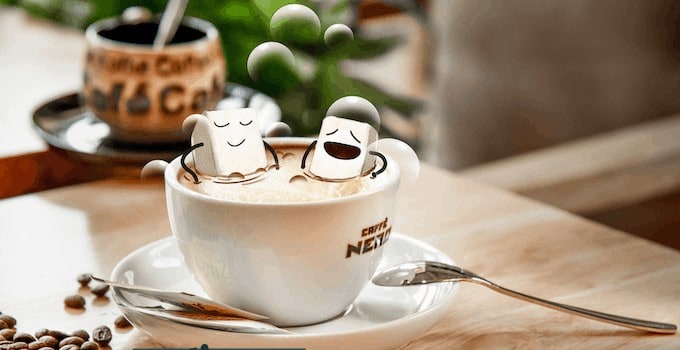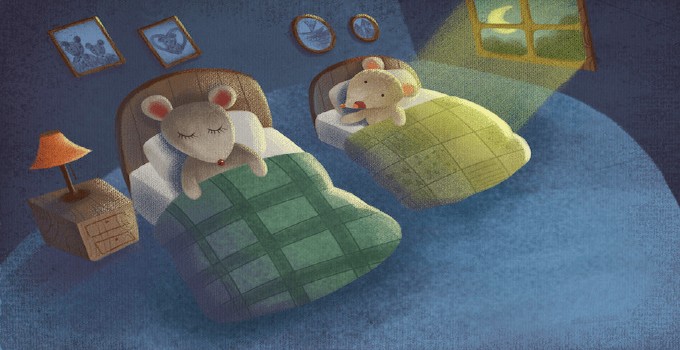The German language is very flexible. This manifests itself both in the flexible syntax and in the many possibilities that the German language offers for creating new words and combining existing words and syllables.
The creativity of the German language can also be seen in all its splendour in the following, admittedly quite strange 21 German words.
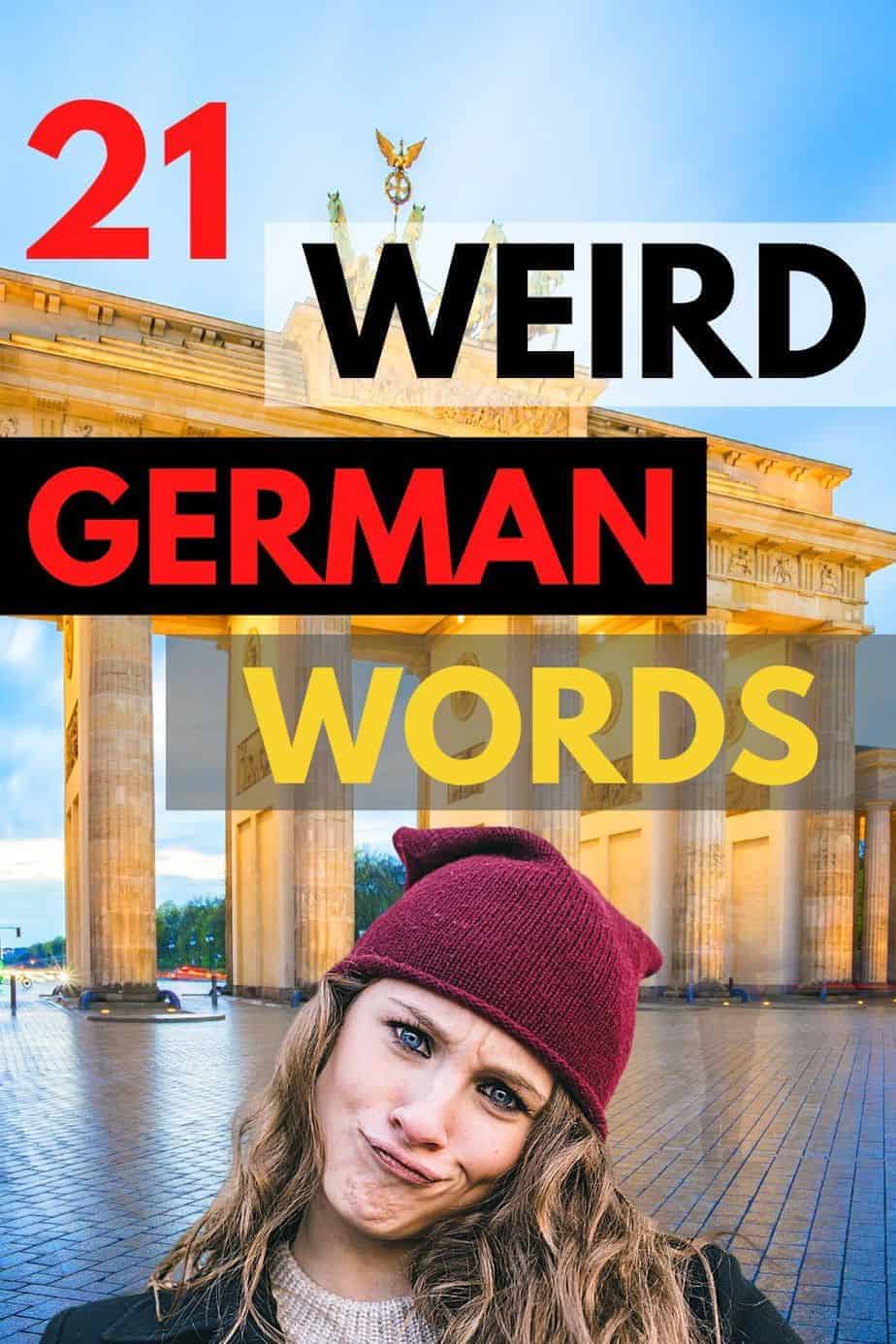
The 21 Weirdest German Words
- Bimbam
- Brückentag
- Fingerspitzengefühl
- Kaffeeklatsch
- Krähwinkelei
- Löwenzahn
- Larifari
- Luftikus
- Muksmäuschenstill
- Paperlappapp
- Pillepalle
- Quadratlatschen
- Schnabulieren
- Schnurzpiepegal
- Schnapsidee
- Tausendsassa
- Tohuwabohu
- Warmduscher
- Wischiwaschi
- Wonneproppen
- Verschlimmbessern
Bimbam
What is the meaning of Bimbam?
Bimbam is an onomatopoeia that refers to ringing bells. It basically describes the sound that ringing bells make (two different pitches).
Other onomatopoetic expressions for ringing bells are “Ding Dong” or even “Klingelingeling”.
Example:
Ach du heiliger Bimbam! Ich wollte eigentlich um 15.00 Uhr Zuhause sein! Meine Putzfrau kommt heute und Sie hat keinen eigenen Schlüssel! (Holy ****! I actually wanted to be home at three! The cleaning lady is coming today and she doesn’t have her own key!)
Brückentag
What is the meaning of Brückentag?
In the working world, a “Brückentag” (bridge day) is a working day that lies between a public holiday and a day that is an off-day anyways (usually Saturday or Sunday).
Example:
Wenn du das Wochenende mit einem Brückentag kombinierst, dann hast du drei Tag am Stück frei! (If you combine the weekend with your day off, then you have three days off in a row! That would be cool.)
Remarks: There is literally no word or phrase to translate “Brückentag” into English directly, so I simply translated it as “day off”.
Fingerspitzengefühl
What is the meaning of Fingerspitzengefühl?
Fingerspitzengefühl describes the quality of having and showing empathy and sensitivity when dealing with others. A person either has it or not when dealing with other people. So a person that is deemed not having “Fingerspitzengefühl” would be a person that is treating others in a rude and cold way.
Example: Du hast nicht das nötige Fingerspitzengefühl, um mit Chinesen Business zu machen! (You don’t have the required sensitivity and flair to do business with the Chinese!).
Kaffeeklatsch
What is the meaning of Kaffeeklatsch?
Kaffeeklatsch simply stands for a cozy get-together with a chat over coffee (and maybe some cake or sweets).
Example:
A: Wo ist denn deine Mutter? (Where’s your mother?)
B: Die trifft sich zum Kaffeeklatsch bei unseren Nachbaren. (She’s having a coffee chit-chat at our neighbor’s place).
Krähwinkelei
What is the meaning of Krähwinkelei?
Krähwinkel is a fictitious place name which, without reference to any of the concrete places of this name, stands for small-town, philistine narrow-mindedness. Krähwinkelei simply stands for somewhat arrogant, narrow-minded behavior.
Example:
Ich kann in einem solchen Dorf, das sowohl sehr rückständig ist und in dem Krähwinkelei an der Tagesordnung steht, nicht mehr länger wohnen. (I can no longer live in this backward village where everybody is just so narrow-minded.)
Löwenzahn
What is the meaning of Löwenzahn?
The meaning of Löwenzahn in German is that of a plant, namely the dandelion. Moreover, Löwenzahn can obviously also be for the tooth of a lion, as Löwe = Lion and Zahn = tooth.
Löwenzahn is a German word named after a lion’s tooth. But instead of meaning just that, it refers to a plant, namely the dandelion. So whenever a German is talking about Löwenzahn, chances are that he is talking about plants in his garden rather than about lion’s teeth, unless he works in a circus or is a zoo director, of course.
Example:
Löwenzahn ist im Garten oft nicht erwünscht, da es sich hierbei um Unkraut handelt. (Dandelions are often undesirable in the garden because they are weeds.)
Larifari
What is the meaning of Larifari?
Larifari refers to pointless talk or doing something in a superficial, careless way.
Example:
Was sie sagte, war alles Larifari. Weiß der Kuckuck, was sie damit eigentlich genau meinte. (What he said was all very unclear. Nobody knows exactly what he meant by that).
Luftikus
What is the meaning of Luftikus?
Luftikus is referring to a guy that is lightheaded.
Example:
Er ist ein richtiger Luftikus. Ein kleiner Junge halt. (He’s really a lightheaded person. He’s still a small boy.)
mucksmäuschenstill
What is the meaning of muksmäuschenstill?
Muksmäuschenstill means that it is perfectly still, and no sound is to be heard at all.
The German language is full of strange nouns but also comes with some weird adjectives. Or let’s say cute adjectives like muksmäuschenstill.
Example:
Und plötzlich wurde es im Zimmer muksmäuschenstill. Petra war nun gewiss im Land der Träume. (And suddenly there was total silence in the room. Petra was now certainly sleeping.)
Paperlapapp
What is the meaning of Paperlapapp?
Paperlapapp is used as an exclamation of rejection of empty, foolish talk, excuses, etc. Thus, this expression is used to describe someone else’s opinion as false.
The etymology of the term is not 100 percent clear. However, it most likely has to do with an archaic word for mash, namely “Papp”. The word “Paperlapapp” itself can be found in dictionaries since about 1880.
Example:
A: Ich habe meine Hausaufgaben nicht erledigt, da ich gestern leider etwas zu spät nach Hause kam und mich dann meine Katze von der Arbeit ablenkte und mein Computer war komischerweise auch sehr langsam und…
B: Paperlapapp! Das ist doch alles nur blödes Geschwafel!
Translation:
A: I didn’t do my homework because I came home a little late yesterday, and then my cat distracted me from work, and my computer was strangely slow and…
B: Fiddlesticks! Don’t make up stupid excuses!
Pillepalle
What is the meaning of Pillepalle?
Pillepalle stands for things that are unimportant. So things that are Pillepalle are of non-important nature and are considered trivialities.
Example:
Das ist doch alles Pillepalle! (None of that matters, really!)
Quadratlatschen
What is the meaning of Quadratlatschen?
Quadratlatschen are very big shoes, or more generally, it refers to big feet that are in shoes.
If you have particularly large feet, some people might be referring to your shoes as Quadratlatschen. It’s only the size of the shoes that matter here because any kind of shoes could be called Quadratlatschen, as long as we are talking about biiiiig shoes
Example:
Hast du Petras Schuhe gesehen? Die hat richtige Quadratlatschen! (Have you seen Petra’s shoes? Her feet (shoes) are just so large!
schnabulieren
What is the meaning of schnabulieren?
Schnabulieren is a verb that means eating. It generally means that you are eating something with great pleasure. It corresponds more or less to the English word “to munch”.
The picture says it all, pretty much. “Schnabulieren” is a verb that is made up by the noun “Schnabel” and -ieren as a suffix that can be found in many verbs such as:
- vibrieren (to vibrate)
- probieren (to try)
- studieren (to study)
- kalkulieren (to calculate
and many others.
To put it simply, if somebody says that you are “schnabulieren” your food, it means that you are eating your food with pleasure and are really enjoying yourself doing so. So, contrary to what most people might think, “schnabulieren” actually has a positive connotation and doesn’t mean something like “eating like a pig”.
Instead of “schnabulieren”, you can also use the verb mampfen, which can be seen more or less as a synonym to “schnabulieren”. Both of these verbs are pretty informal, but still kinda cute, to be honest.
Example:
Und ich sah ihm zu, wie er genüsslich sein Müesli schnabulierte. (And I watched him enjoy his muesli (to the fullest).
schnurzpiepegal
What is the meaning of schnurzpiepegal?
The meaning of schnurzpiepegal is simply that you don’t care at all about something. So whenever something is schnurzpiepegal to you, then you just really don’t care about it.
For “I don’t care”, you would usually just say “Es ist mir egal.” If you are saying, “Es ist mir schnurzpiepegal”, this will make your statement much stronger and will let the other people know, that you truly don’t care about it at all.
The word schnurzpiepegal is made up by the elements schnurz + piep + egal. Schnurz is an adjective. Piep is actually referring to pipe; therefore the man smoking a pipe in the picture above.
Example:
Was du den ganzen Tag so machst, ist mir eigentlich schnurzpiepegal. Wir sind keine Freunde mehr. (I really don’t give a **** anymore what you do all day. We are no longer friends.
Schnapsidee
What is the meaning of Schnapsidee?
A Schnapsidee is an idea that is either crazy or doesn’t make any sense at all.
Schnaps is the German word for high-percentage alcohol. The word comes from the Lower German language and is related to the word “schnappen” (to snap/to grab), which refers to the fact that Schnaps is usually drunk in a quick sip from a small glass.
This kind of small glass had several names, one of them being Schnapper and another one Schnabbes.
Example:
Peter kannte Maria erst seit 3 Wochen und wollte Sie bereits heiraten. Was für eine Schnapsidee! (Peter had only known Maria for 3 weeks and wanted to marry her already. What a silly idea!
Tausendsassa
What is the meaning of Tausendsassa?
When we are talking about a Tausendsassaa, we are talking about someone that has numerous talents.
The word Tausendsassa is made up by the noun Tausend and by Sassa. Tausend is a counting unit in German and simply stands for one thousand. So literally speaking, we talk about someone that has a thousand talents here. However, it is the second part of the word, namely “saßa” where things get really interesting.
Saßa is a shout to call hounds at a hunt. It is believed to stem from the French word “ça”, which means this/that.
So the literal meaning of Tausendsaßa is something along the lines of “(a) thousand of this and that.”
Example:
Dieser Typ ist wirklich ein Tausendsassa! Er ist ein talentierter Schauspieler, kann programmieren und spricht nebenbei auch noch 7 Sprachen. (This guy is really a jack of all trades! He is a talented actor, knows how to program and, by the way, speaks 7 languages.)
Tohuwabohu
What is the meaning of Tohuwabohu?
Today the term “Tohuwabohu” is generally used to describe a big and hopeless mess / chaotic situation.
Example:
Was unsere Kinder gestern wieder für ein Tohuwabohu veranstalteten, echt unglaublich (What a hullabaloo our kids caused yesterday, really unbelievable.)
Warmduscher
What is the meaning of Warmduscher?
Warmduscher is a term that is used for someone that is believed to be weak or to be a coward.
In German, there are many synonyms for Warmduscher. Some of them are highly amusing. Here are a couple of them for your entertainment:
- Weichei
- Schattenparker
- Softie
- Damenradfahrer
- Jammerlappen
- Muttersöhnchen
Example:
Steve ist ein Warmduscher, der schaut sich garantiert keine Horrorfilme an! (Steve is a wimp, he is definitely not into horror movies!)
Wischiwaschi
What is the meaning of Wischiwaschi?
The word Wischiwaschi is a term for confused talk whose meaning is not at all clear to the listener. Wischiwaschi is also used to describe things that appear imprecise or superficial.
Example:
Peter: War alles wieder so Wischiwaschi, was Daniel mir gestern erzählt hat. Ich glaube kein Wort davon! (What Daniel told me yesterday, simply didn’t make any sense to me. To be honest, I don’t believe a word of it. )
Wonneproppen
What is the meaning of Wonneproppen?
Wonneproppen refers to a small child, usually a well-nourished child.
Example:
Marcel: Ach die Emma, ist Sie nicht süss? Was für ein Wonneproppen! (Emma is really a sweety, right? What a nice little baby!)
Verschlimmbessern
What is the meaning of verschlimmbessern?
Verschlimmbessern refers to the act of trying to improve something but actually making it worse by trying to do so.
Example:
Ich würde den Text nicht noch einmal korriegen. Du verschlimmbesserst damit sicher aller nur noch! (I wouldn’t go over the text again. You’ll only make it worse.

Hey fellow Linguaholics! It’s me, Marcel. I am the proud owner of linguaholic.com. Languages have always been my passion and I have studied Linguistics, Computational Linguistics and Sinology at the University of Zurich. It is my utmost pleasure to share with all of you guys what I know about languages and linguistics in general.

